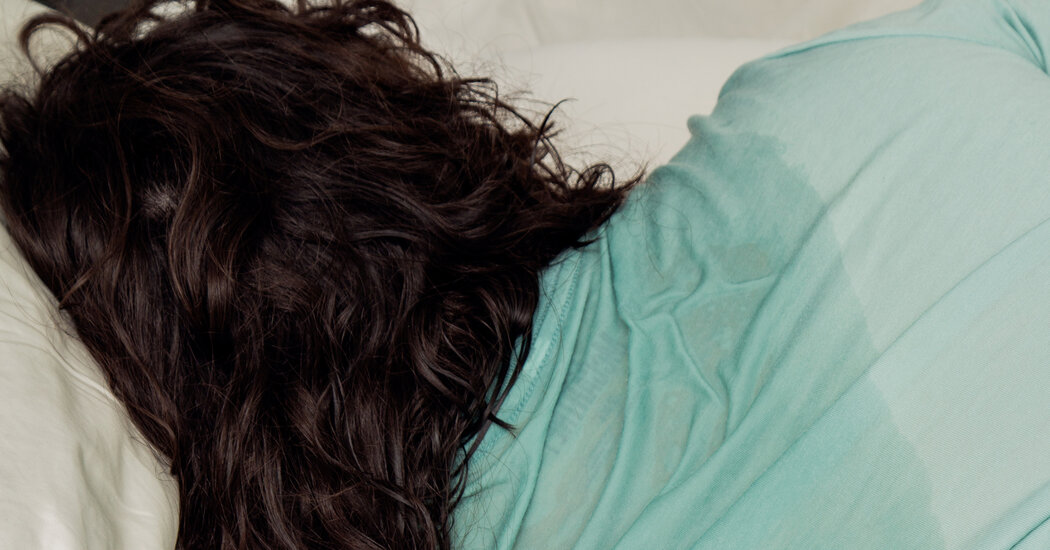
Q: Why do I sweat in my sleep?
You fall asleep at a comfortable temperature — not too hot, not too cold — only to wake up a few hours later drenched in sweat. Sometimes, your pajamas are soaked through, and you might even feel the need to change your sheets before returning to sleep. You’re wet, uncomfortable and maybe a little worried. What is going on?
Night sweats are “a weird symptom, because mostly they’re harmless, but every once in a while, they’re not, so it’s certainly something that we always take seriously,” said Dr. Kate Rowland, an associate professor of family medicine at Rush University Medical College in Chicago.
Sweating during sleep is a relatively common complaint that can affect people across the age and gender spectrum, Dr. Rowland said. Surveys of adults visiting their primary care doctors for unrelated reasons have found that between 10 and 40 percent say they experience night sweats at least occasionally.
There are many potential causes of night sweats, so when a patient tells Dr. Rowland that they’re waking up soaked during the night, she’ll want to know more.
“One of the first things we ask is how warm is it in your room?” she said. “If you wake up and you say, ‘Oh my gosh, it’s hot in this room,’ then we say, ‘Well, adjust the temperature accordingly.’”
The National Sleep Foundation recommends a bedroom temperature between 60 and 67 degrees for comfortable sleep. If you’re not able to keep your bedroom that cool, you can try adding a strategically placed fan, Dr. Rowland said. Switching to lighter bedding or sleepwear might also help.
“It’s tricky, because the temperature that makes you feel the most comfortable for falling asleep may not be the most comfortable for staying asleep,” she said.
Indeed, being cozy and warm is helpful for falling asleep, said William Wisden, a professor of life sciences and a sleep researcher at Imperial College London. Just as other mammals build nests before sleep, we don pajamas and curl up under blankets at bedtime, and studies have shown that people fall asleep more quickly after a warm bath, shower or foot soak, he said. “But then, if you get too hot during the night, and you’ve got a very thick duvet on, obviously, your body will try to regulate its temperature.” And sweating is one of your body’s tools for cooling down, he said.
If you’re sweating at night even after reducing your room temperature or taking other steps to cool your sleep setup, it’s worth seeing a health care provider to consider possible medical causes. They’ll likely ask how long and how frequently you’ve been having night sweats, whether they’re mild or they drench your pajamas, and if you have additional symptoms such as fever, weight loss, fatigue, cough, shortness of breath or pain — “or any other symptoms that just don’t seem quite right for that patient,” Dr. Rowland said.
Any infection that causes a fever might result in sweating during the day or night, but a few serious illnesses including tuberculosis, H.I.V. infection, endocarditis (inflammation of the lining of your heart valves and chambers), malaria and mononucleosis, have been specifically associated with night sweats. And rarely, severe night sweats may be a symptom of a cancer like lymphoma, Dr. Rowland said.
“You can narrow things down pretty quickly with a few lab tests and a few detective-like questions,” said Dr. Andrea Matsumura, a sleep medicine physician at The Oregon Clinic in Portland and spokeswoman for the American Academy of Sleep Medicine.
Dr. Matsumura said she often sees patients in the menopausal transition whose sleep is fragmented by night sweats; along with hot flashes, these often begin several years before the final menstrual cycle and can persist for years afterward. If menopausal night sweats are interfering with a good night’s sleep, it’s worth talking with your health care provider about treatment options, she said.
Among her sleep medicine patients, excessive nighttime sweating occurs “typically because they’re having some sort of abnormal breathing in their sleep, and that’s a sign of sleep apnea,” Dr. Matsumura said. Studies have found that night sweats can also be associated with insomnia, restless legs syndrome and narcolepsy.
Finally, many medications can cause night sweats. Among the most common culprits are antidepressants, diabetes medications and certain hormonal therapies. If a medication seems to be a likely cause, Dr. Rowland will talk with her patients about the risks and benefits of stopping or changing the medication, depending on how bothersome the night sweats are.
But very often, Dr. Rowland said that she can’t pinpoint the cause of night sweats in her patients, “and that’s always frustrating.” In those cases, she emphasized that patients should let her know if their night sweats worsen or if they experience any new symptoms.
Otherwise, sweating in sleep may just be a part of how your body regulates its temperature at night, Dr. Rowland said. Our usual circadian rhythm includes a small, steady decline in core body temperature throughout the night, and sweating is a “normal, physiologic response” that may help you reach or maintain that lower temperature, she added. And “some people sweat more than other people do.”
Normal or not, night sweats can be uncomfortable and disruptive to sleep. In addition to reducing your bedroom temperature and adjusting your sleepwear and bedding, Dr. Matsumura recommended avoiding exercise, drinking alcohol or hot beverages, and eating a heavy meal too close to bedtime, all of which she said can cause sweating during the night.
If you normally sleep with a partner, you might also try sleeping separately for a few nights to see if that helps, Dr. Rowland said. “Sometimes that other person is like having a 180- or 200-pound, 98-degree furnace next to you and can also affect your temperature regulation overnight.”
Very often, coping with night sweats means performing a series of individual experiments in pursuit of a more comfortable snooze. “There’s nothing magic,” Dr. Rowland said. “Different things work for different people.”
Alice Callahan is a health and science journalist based in Oregon and a frequent contributor to The New York Times.




